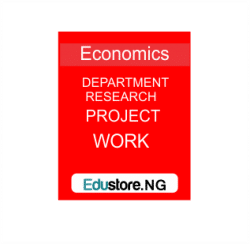FORECAST OF EXCHANGE RATE DETERMINANTS IN NIGERIA
ABSTRACT
It has been noted that the Nigeria economy has gone through series of transformation since independence. Her exchange rate determination has taken various shapes from administratively deformed rate to a market determined rate. These have also be associated with deficient problems. As a result of these problems, the government through the help of the CBN (Central Bank of Nigeria) tries to regulate the exchange rate system. The adoption of Structural Adjustment Programme (SAP), where main element was Second-tier Foreign Exchange Market.
The hypotheses of this study indicate that there is a significant positive relationship between Exchange Rate, Interest Rate, External Reserve and Inflation and there is a negative relationship between exchange rate, Gross Domestic Product and Balance of Payment. To validate this hypothesis data gotten from secondary sources were estimated and analyzed among the Ordinary Least Square Method (OLS) and Cochrane-Orcutt Method. The independent variables used were balance of payment, Gross Domestic Product, Interest Rate, External Reserve and Inflation, while the dependable variable was exchange rate. There was also a drive towards forecasting exchange rate.
The empirical analysis showed that about 87% of the mean value of the exchange rate is explained by the explanatory variables. This shows that the estimated model regression line is a good fit and the result of the null hypothesis for the forecast was less than the figure of the “t†take, which means it forecast well.
- For Reference Only: Materials are for research, citation, and idea generation purposes and not for submission as your original final year project work.
- Avoid Plagiarism: Do not copy or submit this content as your own project. Doing so may result in academic consequences.
- Use as a Framework: This complete project research material should guide the development of your own final year project work.
- Academic Access: This platform is designed to reduce the stress of visiting school libraries by providing easy access to research materials.
- Institutional Support: Tertiary institutions encourage the review of previous academic works such as journals and theses.
- Open Education: The site is maintained through paid subscriptions to continue offering open access educational resources.




